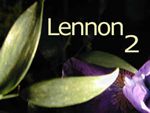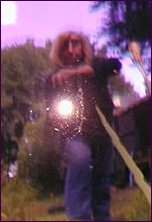
Blues
for Mai Cramer
Quote
"Learn to navigate the computer net, or be relegated to the second tier of the future -- a shopper. ``Interactive TV'' will restrict your choices to which movies you'll watch and which ATM account to debit for those cubic zirconias.
True ``interactivity'' allows you to generate content from a keyboard,
to send and receive. Not only celebrities get ``microphones.'' You too
have a voice."
Netstock: The Global Village is Finally Wired
Sheila Lennon, 1994
Tribe
Andrews
Blake
Cocroft
Copeland
Cornett
Doctorow
Lasica
Levine
Paul
Poe
Powers
Robins
Romanesko
Searls
Wigley
Winer
Tools
Google Search
Google Image Search
GooFresh: New pages
My brother's project
USS Saratoga Museum Foundation
My other sites
Subterranean Homepage News
at projo.com
Vacation edition of Subterranean Homepage News
(Why"The Reader"?)
July 12, 2002
NETSTOCK
The global village is finally wired
This was first published in the Providence (Rhode Island, USA) Sunday Journal Magazine, Aug. 7, 1994, and further distributed via the New York Times News Service. The author grants permission, etc., to free systems to post it or pass it on. Just keep it free.
``I still get a chill through me. Woodstock happened because a lot of people believed in those things -- helping each other, sharing, making it better together.'' -- Al Fumognari. Providence Sunday Journal, August 13, 1989
You must know by now that Woodstock was more than the mud and the stars and the music.
An experience, not an album.
"To the media it was a catastrophe, but to us, it was the very best life," Carmino Scaglione of Scituate, R.I., recalled in 1989.
For three days in 1969 he and I and a half-million like-minded strangers had come together and created the world we wanted to live in. There were no rules, and no violence.
Woodstock was as far as we could take the '60s. Freedom could work, but we were kids. We didn't know enough, and Richard Nixon's America wasn't ready for more than our dress rehearsal.
We went home, different, some too different ever to fit into anywhere.
Others forgot what happened at Woodstock and got lost in the glitz.
I bought the "Whole Earth Catalog," the owner's manual of the counterculture, and discovered Buckminster Fuller, cheap travel and natural childbirth.
Twenty-five years later, Richard Nixon is dead, our dissatisfaction with government is widespread, and the global village is finally wired. It's time to move into it.
"A million small computers, linked by ordinary telephone lines, can suddenly wield formidable computing power that is extremely hard to control in a rigidly hierarchical, centralized manner." -- Howard Rheingold, "Virtual Communities."
The information highway will not be televised.
Learn to navigate the computer net, or be relegated to the second tier of the future -- a shopper. ``Interactive TV'' will restrict your choices to which movies you'll watch and which ATM account to debit for those cubic zirconias.
True ``interactivity'' allows you to generate content from a keyboard, to send and receive. Not only celebrities get ``microphones.'' You too have a voice. You can champion an idea, object to an outrage, question authority. Like-minded people are again coming together, but this time the "virtual world" is computer-mediated. You'll have to make friends with machines, or at least learn their language, in order to enter the future.
Mastering the computer may prove a stretch, harder in its own way than the mud and thirst and heat of Woodstock. But many people will help you, and ask only that you pass on what you learn to someone a few steps behind you.
I haven't felt smart since I arrived online, but I'm having a great time.
Unorthodox information -- topics not seriously covered by the mainstream press -- is exchanged like contraband. Such '60s staples as herbs and alternative medicine, underground politics, altered states, organic gardening, vegetarian cooking and astrology mix with such '90s concerns as virtual reality, ACT UP, jobs wanted and health care.
Politicians who venture online will find a well-informed constituency already here, and can expect to account for their actions publicly and often.
``Information wants to be free.''-- Stewart Brand, founder of the "Whole Earth Catalog" and The Whole Earth 'Lectronic Link, the WELL.
In Woodstock's economy, your money was useless. What we had was shared, and what was ordinarily exchanged for money was given away.
Many local bulletin boards offer free public access to global nets. Freelance computer programmers distribute inexpensive software through them: "shareware" that you're welcome to try before you buy.
On the net, you can give away all that you have and still have it all. Electronic information is not a hard commodity.
What has value here are the people who can generate information. What you know and how you'll share it is your currency.
``It was a little bit frightening to have such freedom, like another world where you could do anything, say anything, be anyone, nobody would stop you.'' Kathleen McDevitt, Providence Sunday Journal, August 13, 1989
In 1989, I went back to Bethel, New York, to what will always be called Max Yasgur's farm, to cover the 20th-anniversary celebration of Woodstock for the Providence Journal-Bulletin, and brought along my 13-year-old daughter, Casey Dahm. I tapped on a laptop in the grass, reporting on a week of local bands lining up to play on the same spot as Jimi Hendrix and Janis Joplin, and on the climactic Saturday night when 10,000 people rekindled that spirit of goodness that pervades the place.
Casey will always remember it as the scene of her first kiss.
This year, Casey wants to be nowhere near the Catskills. The free, eight-day Rainbow Gathering and Megarave in Arizona's the Grand Canyon sounds more interesting. The Rainbow People, tie-dyed nomads, are gathering there with the Zippies.
Zippies?
One, a fashion failure wearing virtual-reality goggles, graced the May cover of Wired magazine, the 18-month-old guide to technohip that's the biggest marketing success since Rolling Stone, and already not as good as it used to be.
Zippies are technohippies from England who deftly mix the music and multimedia of the rave club scene, Druid religious roots, psychedelics and that old hippie freedom trip. Their tour is called Pronoia -- the sneaking feeling that others are conspiring to help you -- and their goal is evolution, a revolution in consciousness. (Sound familiar?)
``When cars got stuck, people would literally lift them up. We were spontaneously working together.'' John Sousa, Providence Sunday Journal, August 13, 1989
The spirit of freakdom rides again, moving as information on a global net that links nearby to nowhere special. It thrives on diversity and disdains commercialism, a movement from the Old World to the New.
The net offers another chance to get it right:
We empower each other by sharing information.
We can create here, together, a society in which everyone has a voice, and everybody's ideas are heard.
It's a different world now, 25 years later, and it's showtime.
![]() See it and say it
See it and say it

After watering the backyard flowers yesterday, I wanted to photograph myself in the mirror ball; I squatted and focused, then stood up, trying to keep the camera low. It worked, except that I'd tripped the autoflash. Those are water droplets on the ball. This is a detail of the photo below. (enlarge)

The actual photo. (enlarge)
Related: Garden Blog
I found 58 Square Feet today, the weblog and journal of a (small) garden in the city. They seem to be out in the garden lately.
DOGMA 2000
The
point
:-->
The manifesto :-->
The dogma :-->
.
. . . . . . . . . . . . . . . . . . . .
DOGMATIC,
FANTASTIC, INDEPENDENT
the rule is only in YOUR head
.
. . . . . . . . . . . . . . . . . . . .
Photos by Sheila Lennon unless they're credited to someone else
Content on this site
may be copied
under the terms of the
Open Web Content License
. . . . . . . . . . . . . . . . . . . . . .